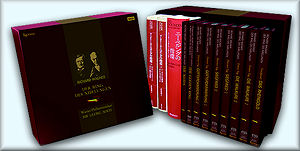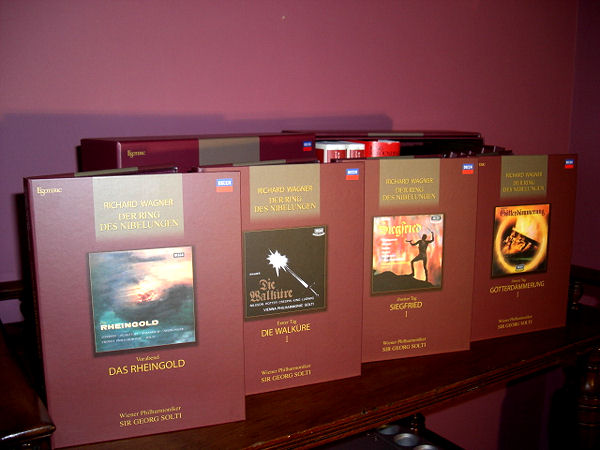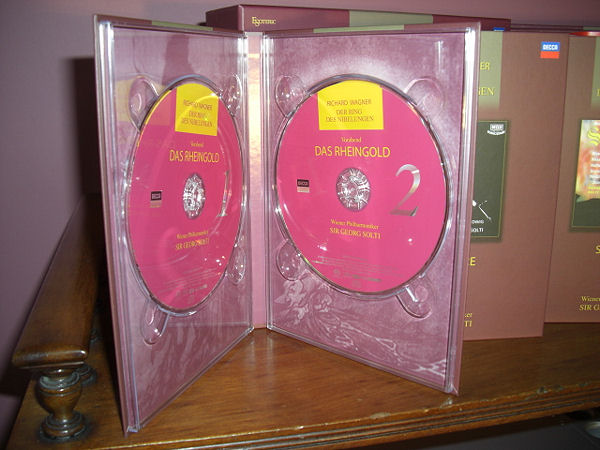 |
 |
|

Esoteric
Japan
Symmetry
Systems UK
See
also Decca remastering 2012
|
Richard WAGNER (1813-1883)
Der Ring des Nibelungen
Das Rheingold in 4 Scenes (1853-54)
Die Walküre in 3 Acts (1854-56)
Siegfried in 3 Acts (1856-71)
Götterdämmerung in 3 Acts (1869-74)
 Soloists plus Vienna State Opera Chorus (Götterdämmerung)
Soloists plus Vienna State Opera Chorus (Götterdämmerung)
Vienna Philharmonic/Georg Solti
rec. Sofiensaal, Vienna, Das Rheingold September – October
1958; Die Walküre May and October – November 1962; Siegfried:
May–June and October – November 1964; Götterdämmerung: October
– November 1965. Producer: John Culshaw; Senior engineers: Gordon
Parry, James Brown
Japanese remaster, 21 December 2009; European release: 21 January
2010; UK import limited to 35 copies; £495; US Price $800+taxes
CDs/SACD Hybrid
 DECCA ESOTERIC ESSD90021-90034 [14 discs: I: 70:34 + 75:16;
II: 65:69 + 64:19 + 28:36 + 70:20; III: 56:46 + 55:33 + 58:48 +
66:04; IV: 62:46 + 57:24 + 67:03 + 77:50 + 1 DVD]
DECCA ESOTERIC ESSD90021-90034 [14 discs: I: 70:34 + 75:16;
II: 65:69 + 64:19 + 28:36 + 70:20; III: 56:46 + 55:33 + 58:48 +
66:04; IV: 62:46 + 57:24 + 67:03 + 77:50 + 1 DVD]
|
|
|
Comparison: The Metropolitan Opera Orchestra and Chorus/James
Levine, DG, rec. 1989

Motoaki Ohmachi, the charismatic and music connoisseur president
of TEAC’s 22-year old Esoteric company (high performance audio
division), began to sponsor and remaster CD/SACD hybrid disc sets
five years ago. Esoteric’s own components and techniques were
used. The products included Beethoven (2007) and Bruckner (2005):
complete symphony sets featuring Günter Wand on the RCA Red Label.
These are already rare and collectible items. Many copies were
presented to friends and customers of the company.
Esoteric’s remasters are licensed from the copyright owners and
limited to 1,000 pressings. Each release goes on sale in Japan
for one month and then the European and American distributors
of Esoteric products may order for their markets. After RCA, issues
were from the studio tapes of Philips, Decca and DG; all members
of the Universal Music Group.
After the first RCA issues, Esoteric moved from sponsorship to
merchandising the discs. The purpose, I believe, is to showcase
to music-lovers what the audiophile pursuit is all about. Distribution
is not through the record trade. Although the price of the individual
Esoteric discs is high (£32 in the UK/$70 in USA plus taxes) I
can assure you that the UK distributor and retailers’ margins
are no more than a handling charge. I must admit, however, that
I have sold several Esoteric hi-fi components to music lovers
who were previously apathetic or dismissive of hi-fi.
Esoteric’s second intent has also been successful. In the days
when downloading is easier, the record labels have neglected the
highest quality of the manufacture of discs. I have already reviewed
examples of CD at its best (for MusicWeb) manufactured by HDTT
which is one of those audiophile labels who prove that the High
Street product is poor sound. For this reason, some British music-lovers
are importing Japanese pressings by mail order, at three times
the UK price. Esoteric want to prove that, since its launch in
1982, CD has progressed in musical quality by a huge margin.
As often retold (especially in the producer John Culshaw’s own
book, Ring Resounding, 1967) and in the 1965 BBC documentary
film (available on DVD and supplied in Esoteric’s presentation
set) Decca Records set out to make the first studio recording
of Wagner’s Ring in the early days of LP and stereo. From the
outset, the goal was to create Wagner’s vision in sound; not a
theatrical production but a studio event. Far from artificial,
the intent was absolutely purist, and the method was to follow
Wagner’s demanding instructions to the letter, regardless of cost.
It is sad to say that this British triumph is almost unthinkable
today. Against all commercial sense and advice, Culshaw was authorised
to hire and organise schedules around the demands of the best
Wagner performers of the day.
Rheingold was recorded in 1959: it is the first night,
the shortest work, and Kirsten Flagstad was cast as Fricka in
days when she was retiring and indeed becoming ill. The artistic
triumph and sales results enabled the next three parts of the
music drama to go ahead. Thus, the four works were recorded in
Vienna over a seven-year span. By then, Decca had its own residence
and studio in the Sofiensaal.
In 1968 Decca issued all four music-dramas in a green and gold
wooden box set of 19 LP records. This gave us three further LPs
as a bonus: Deryck Cooke’s spoken Introduction in English featuring
193 excerpts from the recordings. For me this was the door to
Wagner: I cannot imagine – nor can I recommend - a better way
to grasp the leitmotif structure of the music. This is not included
in the Esoteric presentation which is a Japanese product.
Returning to 1968, the Decca LP pressings from its factory in
New Malden, Surrey were dreadful; clicks, pops, and heartbeats
mocked the music. I couldn’t bear it. I purchased the German Teldec
issue but immediately gave it away to a friend. Sure enough, the
1983 high-tech DMM (Direct Metal Mastering) surfaces were silent,
but the transfer made the music sharp and sterile.
The first digital remasters were issued on CD in 1985. They sounded
horrible. In 1997 the chief engineer at Decca, James Lock, who
had worked on the original sessions, used a newer CEDAR process
to remaster the analogue tapes. The four works were issued on
14 CDs. I was still very unhappy with the compression of sound.
It seemed that the immense and monumental undertaking in Vienna
had foundered each time at the last hurdle, typically, for Britain,
at the stage of manufacture. After 1997 I had given up all hope.
I sampled other Rings, but Solti reigns supreme. He brought a
fresh approach: dramatic, intense, hard-driven and quite magical.
Other recordings, conductors, orchestras and singers contribute
many angles and insights but the Vienna Ring is definitive.
Regular readers will know that my aversion for “modern” Wagner
does not border on contempt, it is propelled into verbal assault
on the perpetrators. My aim is to get close to what Wagner meant;
that is in itself infinite and unattainable. If you like rude
Rhinemaidens and sexy Siegfreids then please enjoy productions
whose producers are probably unable for many reasons to do what
was done once in a lifetime in Vienna between 1959 and 1967. The
Decca team attempted to follow all of Wagner’s unreasonable demands
on the assumption that perhaps he knew what he was doing.
It is for such an unrepeatable event that the recording industry
exists. Thanks to Esoteric, one thousand people can enjoy it;
or fewer, as some customers have bought multiple boxes to speculate.
I bought mine because the rich sound of the Viennese, surely the
world’s most amazing opera orchestra, can be heard at home as
never before; and more than that, the vivid sound justifies the
well-publicised building of the special instruments and sound
effects. Much trouble, expertise and money were devoted by Decca
to these ends. Now they emerge as splendid; indeed awe-inspiring.
Physically, the Esoteric set is substantial: 6kg comparing with
the High Street Decca box set at around 1kg. The new set contains
three books: two are the most substantial librettos I have ever
seen, in German and Japanese. The third is a Japanese copy of
John Culshaw’s book; extremely useful. And then there are two
booklets: The Notes and Track List - also in German and Japanese
however, you can save the European Decca CD set booklet before
you discard the CDs. The Japanese contents continue with a DVD
being the BBC documentary film. Finally, seven DVD format volumes
protect the four musical works on fourteen CD/SACD hybrid discs.
All are housed in a luxury box, protected by semi-permanent transparent
sheath, and wrapped in a cardboard outer carton for shipping.
Without any doubt, this issue is the ultimate accomplishment of
the recording industry. It cannot be any other way. I am not saying
that all music after Wagner was downhill, but over twenty-five
years his creative genius defined symbolist or fusion of the arts
in one masterwork: drama, poetry, myth and music are amalgamated
as no one else had envisaged and probably no one, even in our
age of high technology and mixing of arts, can ever equal.
The Ring’s theme is not just the old Norse-Germanic world of the
pre-Christian mindset - do not call it Pagan - but the perennial
human predicament of the triumph of gold over love. It is a very
tall order to recreate for the modern listener this timeless world
beyond any territory. Frankly, I do not think that modern productions,
far less home videos, can do it.
Four evenings, like a pilgrimage, at a theatre can do it. So can
pure sound. Back to the Esoteric remaster. At last, we have in
our hands what Solti, Culshaw and others heard in the control
room at the Sofiensaal in Vienna. On a large-scale system of high-definition
home stereo it is ravishing, enveloping, awesome, and humbling
to listen to the power and purity of the Vienna musicians. It
may, or not, be your taste, but Georg Solti’s interpretation remains
the most forceful and potent. The music is propelled into a soundscape,
not by loud volume or fast tempos, but by means of emotional thrust
and conviction. The special Wagner effects and instruments, six
harps for Rheingold, anvils, drums, steel Swiss-horns,
constructed over months and played for a few brief seconds, will
leave you struck down in awe. Now, at last, we can hear them without
the medium mocking the message.
As a comparison, I chose James Levine’s Ring on DG because it
is a good stereo recording of a “driven” and dramatic reading.
Separated from Decca’s production by thirty years it is an excellent
modern digital recording; it suffers none of the harsh treble
or compression of early CDs. An expert remastering of this excellent
sound would be a very welcome thing. There is much that is great.
Sonically, I rediscovered Lawson’s Law. Recordings sound best
replayed on domestic loudspeakers closest to the studio monitors
on which they were voiced. DG credit B&W loudspeakers; Decca
acknowledge the use of Tannoy Canterbury speakers. And thus it
emerged at my home. On an Esoteric player, amplifier and Tannoy
loudspeakers (a matched system) not a trace of the “chestiness”
one might look for. The natural sound was breathtaking, making
it impossible to break the listening session. The DG recording
sounded compressed and slightly artificial until played on a British
sound hi-fi (ProAc loudspeakers). The advantages of synergy (or
consistency) were reversed. This is disturbing. Esoteric, longtime
collaborators with Tannoy, are now publishers of CDs, and so they
complete a chain of transmission - from programme source to monitor
loudspeaker.
Esoteric are entitled to be proud of their amazing equipment which
was used in the CD mastering process. I reviewed last year for
MusicWeb International their Curzon/Britten/Decca Mozart Piano
Concertos on CD/SACD. It was CD of the Month. It is now a much
sought-after item. Technically, the Ring transcription has moved
even further ahead of Esoteric’s Decca issues of last year, an
amazing achievement. The sound is vivid and yet there is practically
no tape hiss. To say that they have made their point is something
of an understatement.
With the Vienna Ring remastered, forty years after the event,
Esoteric has fulfilled the ultimate potential of the recording
industry.
Jack Lawson

|
|















